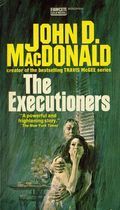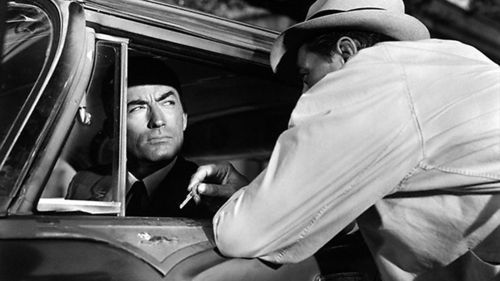Noir as Moral Instruction
“I suspect we’re near the end of the glamor days of juvenile delinquency. I think a very unusual crop of kids is coming along. Good kids, but strange. They’ve become bored with the dissipations of their elders and the animal philosophies of their contemporaries. They are tired of using the bogeyman of military service as a built-in excuse for riot and disorder. This is a very moral crop of kids. They are sophisticates, but they practice moderation by choice. They seem to have a sense of moral purpose and decent goals, which, God knows, is something difficult to find in the here and now. They are all right. But they appall me a little. They make me feel like a doddering degenerate.”
John D. MacDonald
The Executioners, p. 85
John D. MacDonald’s 1957 novel The Executioners served as the basis for Cape Fear, the 1962 thriller starring Gregory Peck and Robert Mitchum. At the novel’s mid-point, inspired by a conversation with his daughter Nancy's new boyfriend, protagonist Sam Bowden gives the speech quoted above about the new generation, which might serve as a epithet for the soon-to-come Camelot era.
 Reading it for the first time this week, however, I was reminded of the op-ed piece David Brooks penned for the New York Times back in April, “Sam Spade at Starbucks,” which expressed some doubt that today’s young do-gooders have an accurate read on human nature, something they could correct by reading some noir fiction. Brooks doesn’t mention The Executioners by name. He should have, because MacDonald's Sam Bowden is very much an idealist confronted by a force of (fallen) nature, a harsh reality not dreamt of in his philosophy of law and order.
Reading it for the first time this week, however, I was reminded of the op-ed piece David Brooks penned for the New York Times back in April, “Sam Spade at Starbucks,” which expressed some doubt that today’s young do-gooders have an accurate read on human nature, something they could correct by reading some noir fiction. Brooks doesn’t mention The Executioners by name. He should have, because MacDonald's Sam Bowden is very much an idealist confronted by a force of (fallen) nature, a harsh reality not dreamt of in his philosophy of law and order.
Bowden is a morally upright attorney who, despite his sophistication, believes in the law. When a menace from his past, convicted rapist Max Cady, gets out of jail and seeks out Bowden for revenge, the lawyer learns just how thick a blindfold Lady Justice wears. To protect his family, he is forced to go outside the law, which does not come easily. The clean cut boyfriend might make gin-and-tonic-sipping Bowden feel like a degenerate, but by most standards he’s a saint. (He’s played in the movie by Atticus Finch. What more evidence do you need?)
Above: Peck (left) freezes Mitchum with his moral glare.
I’m forty-two years old. I spend a fair amount of time in the company of the younger generation, and there’s something the resonates with me both in Brooks’ op-ed and Bowden’s speech. It has to do with the youthful assurance of moral certainty. The appeal of noir, from a theological and moral standpoint, is that it offers a version of reality pretty much cleansed of such certitude. Noir fiction doesn’t assume a Manichean division between good and evil. It acknowledges the individual and systemic extent of human corruption, which touches even the good guys.
Over the past week, apropos the recent riots throughout the Middle East, I’ve seen a quotation of Steven Weinberg’s paraphrased numerous times, to the effect that good people do good things, evil people do evil things, but for good people to do evil things, that takes religion. It’s one of those pithy rhetorical statements that sounds pretty good until you stop and think. In melodrama, the human race is divided up between the good and the evil, the white hats and the black. The good tribe battles the bad tribe––if only they could be snuffed out, everything would be fine. Reality is a bit more complicated. To snuff out evil, you’d have to get rid of us all.
Nancy Bowden's English teacher, Miss Boyce, knows better. According to her, there’s a link between good fiction and moral perception.
“Good fiction is good,” Nancy relates, “because is has character development in it that shows that nobody is completely good and nobody is completely evil. And in bad fiction the heroes are a hundred percent heroic and the villains are a hundred percent bad.”
To Nancy, her father’s nemesis Max Cady seems to be the exception. “But I think that man is all bad.” MacDonald, pulp novelist, is having some fun here, of course. But Sam Bowden is quick to correct his daughter. There are reasons behind Cady’s actions, justifications. And as his own compromises illustrate, Bowden is a dab hand at rationalization, too. A man will do what he has to do to keep his family safe, law or no law.
Societal solutions that rely on an alliance of the good people against the bad are naive (at best) because they tend to be especially blind to the evil they themselves do. These are the evils which the noir mindset can’t help bringing to light. David Brooks is right to recommend Chandler, Hammett and others as a corrective to un-nuanced optimism. And Sam Bowden is right to be a little appalled by this “very moral crop of kids.” If there’s one thing noir can teach you, it’s never to get too comfortable in the presence of those who think they’re always in the right.




